Geriatric care: Mangalore strikes a fine balance
Geriatric care: Mangalore strikes a fine balance
Mangalore Today News Network
By Satya Reddy
Mangaluru, August 4, 2018: Across the globe, in both developed and under-developed countries, as populations explode and social norms change at a terrific pace, the one demographic that suffers the most are the elderly. Countries like China, Japan, India, the UK etc…are reeling under enormous pressures to support their ageing populations.
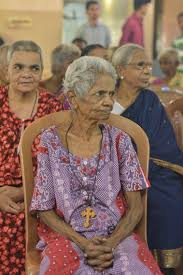 In a survey done in 2011, India reported an ageing population of 104 million. Over decades, a combination of factors like industrialisation and urbanisation have disrupted families and communities beyond recognition. Joint families, usually seen as a safety net for the elderly, have given way to nuclear families. In the process, the elderly have found themselves displaced, suddenly vulnerable to economic, financial and emotional problems.
In a survey done in 2011, India reported an ageing population of 104 million. Over decades, a combination of factors like industrialisation and urbanisation have disrupted families and communities beyond recognition. Joint families, usually seen as a safety net for the elderly, have given way to nuclear families. In the process, the elderly have found themselves displaced, suddenly vulnerable to economic, financial and emotional problems.
According to statistics, in 2005, China had 100 million people over 65. By 2050, the figure is expected to exceed 330 million. Japan is not far behind. In 2014 an estimated 33% of the Japanese population was above 60. The elderly made up a quarter of the total population and by 2050, that is expected to rise to a third of the population. America and UK, despite being global political heavyweights, are struggling to provide basic medical care for their rapidly ageing populations.
The question every policy maker should ask is, how to solve this problem? According to Olinda Pereira, a sprightly nonagenarian highly respected in Mangalore, decades ago, when youngsters from the city began going to the Gulf for work , they left behind their elderly folk thinking they would be back soon ‘after making some money’. But that never happened quickly enough and the elderly had no choice but to move into Old Age Homes or face the prospect of living alone and unsupported.
In the past, each community in Mangalore had a way of supporting the elderly. Temples, Mosques and Churches all had volunteers to care for the elders either at home or in institutions supported by donations. But Old Age Homes and other assisted forms of living came with all sorts of misconceptions -the most popular one being that the children are uncaring and had ‘dumped’ their elderly into a Home. 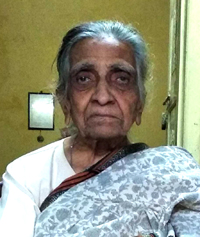 In order to restore the dignity of the elderly and infuse their lives with a sense of purpose, Miss Pereira started ‘Vishwas Trust For The Elderly”. This Day Care Centre, launched in 1999 was a revolutionary idea in that those above 60 could come to a designated place to socialise whenever they wanted to. Games, yoga, basic health check-ups and physiotherapy were offered. Those who needed help at home could count on MSW students from Roshni Nilaya to drop in for a chat, help with paper work, run small errands etc.. Flipping through an old photo album, Miss Pereira and her assistant, Felcy recount the good old days when a big group used to gather at Vishwas to socialise, practice for skits, go on day trips, celebrate birthdays and listen to guest speakers expound on various topics.
In order to restore the dignity of the elderly and infuse their lives with a sense of purpose, Miss Pereira started ‘Vishwas Trust For The Elderly”. This Day Care Centre, launched in 1999 was a revolutionary idea in that those above 60 could come to a designated place to socialise whenever they wanted to. Games, yoga, basic health check-ups and physiotherapy were offered. Those who needed help at home could count on MSW students from Roshni Nilaya to drop in for a chat, help with paper work, run small errands etc.. Flipping through an old photo album, Miss Pereira and her assistant, Felcy recount the good old days when a big group used to gather at Vishwas to socialise, practice for skits, go on day trips, celebrate birthdays and listen to guest speakers expound on various topics.
But the one spoke in this otherwise perfectly turning wheel is finances. For nearly a decade, Miss. Pereira has been filling innumerable forms and sending them off to government agencies in the hope that she can get more funding in order to offer more facilities. But more often than not, she has had to depend on her savings or donations from well-wishers in order to keep her pet project going.
In 2016, this model of caring for the elderly was replicated by Mr. N.Vinaya Hegde, Chancellor of NITTE University. The donation of a van from Syndicate Bank, came as a timely support for the project- ‘a day care centre for the elderly’. Housed in a wing of the KSHEMA /NITTE hospital in Derlakatte, this is a place where citizens over 60, irrespective of their socio-economic condition, can spend time socialising, get a medical check up, have meals and get dropped back home in the evening. And the beauty of this set-up is that it is all free as everything is taken care of by the hospital.
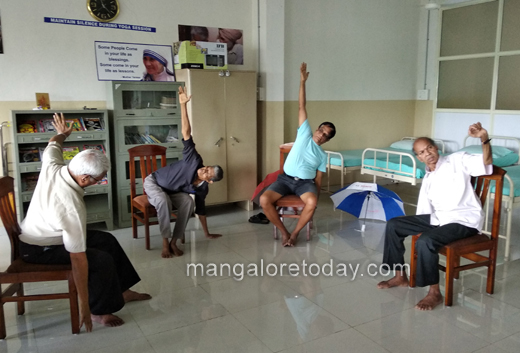
On a sunny Monday morning, the hospital is busy- students in groups barge along corridors in gleaming white coats, patients wait to register and busy doctors talk quickly into their phones as they move from department to department. Further on from the oncology department is a metal door that leads into Kshema Sandhya and in here, you will find a regular group of 16 elderly people engaged in reading, writing, playing board games or dozing. While there are more than 100 people registered, just under 20 are the ‘regulars’.
Mr Damodar B, dressed in a comfy pair of shorts and a tee, had retired as a principal of a catering college. For years, he had been busy training and teaching in a number of cities- Bangalore, Mumbai, Goa…With a son in Bangalore and a daughter settled in Canada, it was only natural he came back to retire in his hometown. “I have plenty of time on my hands. Here I can watch TV if I want. There are physiotherapy and yoga sessions. I can read, browse on the computer…..and by 4pm, I get into the van with the others and get dropped off near my place!”
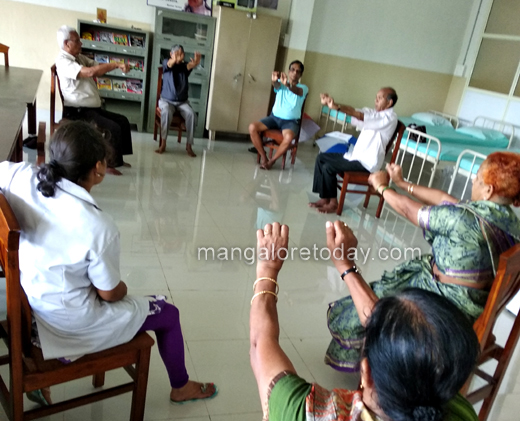
Mr K B Melanta is in his late 80s. Tall and soft-spoken, he too has a similar story to tell. His daughter lives in the building next to his and his son lives in Bangalore. Having retired as a Senior Marketing Officer with the Government of India and with time on his hands, Mr Melanta decided to join the Day Care centre. Initially the free and convenient transport facility was a big plus but now, meeting his regular group of friends is what makes him come daily.
Mangalore has a number of organizations catering to the needs of the elderly. The Cheshire Home, Mangalore Senior Citizens Association , and Action Group for the Elderly are just some of the charities. But in a 2018 survey on ‘Elder Abuse’ done by HelpAge India, Mangalore had the dubious distinction of having the largest number of ‘abused’ elders compared to other metros. Abuse in this instance was said to be emotional, verbal and very rarely, physical. Many city-based NGOs have flatly denied these statistics saying the situation is complex and asking just 5014 elderly people across 23 cities is not going to give anyone the clear picture.
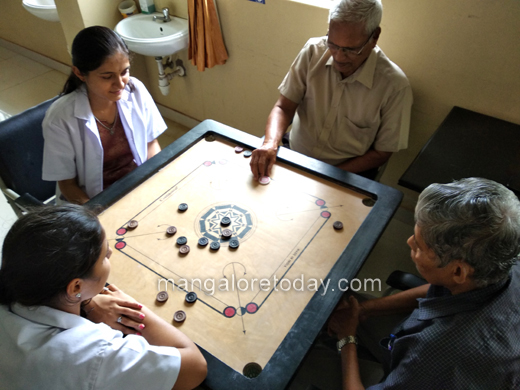
Back in KSHEMA Sandhya, it is mid morning and a physiotherapy session is on in full swing. Mrs. A (name withheld on request to protect identity) has opted out as she wants to complete her Sanskrit lesson instead. “This set up (elderly Day Care) is good for people who live alone. Before, I would spend my day watching TV, I would sleep too much….My son would call me from Bangalore, anxious that I was alone.” Joining her son in Bangalore was not an option as she did not know anyone in Bangalore, had nothing to do and nowhere to go. At the Centre, she reads, eats well, exercises and gets to spend some time in the KSHEMA temple compound before going home.
Looking after the 15 odd regulars is Nurse Smitha. She keeps a tab on their BP, regularly checks the diabetics in the group, monitors the heart and dialysis patients etc..During summer, many elderly get dizzy due to the heat, some have emotional problems and look to her for a chat-the problems may seem trivial to some but here, they are all given a hearing. Supporting her are MSW students who come regularly to play games, sing songs and help out the elderly in any which way.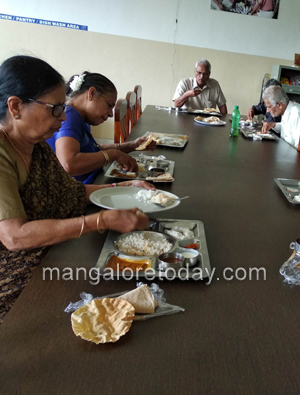 Sandhya Kamath and her husband Suresh Kamath are a quiet couple. While Mr. Kamath reads, his wife is busy filling in a large book with the ‘rama namam’ and in her spare time, she makes cotton wicks for when she goes to temples. Opening a little box, she takes out a small ball of cotton. Tearing out a wisp, she presses it firmly into her palm and begins rolling the wick. From time to time she adds more cotton and in a very short time she has a small bundle of wicks ready.
Sandhya Kamath and her husband Suresh Kamath are a quiet couple. While Mr. Kamath reads, his wife is busy filling in a large book with the ‘rama namam’ and in her spare time, she makes cotton wicks for when she goes to temples. Opening a little box, she takes out a small ball of cotton. Tearing out a wisp, she presses it firmly into her palm and begins rolling the wick. From time to time she adds more cotton and in a very short time she has a small bundle of wicks ready.
Scattered about the room are people freely pursuing their hobbies. This is indeed a far cry from the popular image many Old Age Homes have that the elderly are not encouraged to do much or contribute in any way.
It was a visit to China that showed Dr. Satish Bhandary, Vice Chancellor of NITTE that institutionalising the elderly was not the way forward. In China, he got to see the elderly out and about, doing exercises in parks, moving about the city on errands, taking care of themselves and socializing in public spaces. “Elderly people should not be treated as a burden on society and should not be neglected”, he says, echoing the words of Mr. Vinaya Hegde.
In keeping with this ideal, those coming to the Day Care Centre are not confined to the room but can head down to the registration area and help patients with the registration paper work or can help with simple tasks anywhere in the hospital. With more people opting for the freedom of a day care facility, plans are on to build a separate unit within the KSHEMA campus.
The working day is drawing to a close and everyone gathers around the table to have piping hot tea and snacks before getting into the van and going home. While there are numerous issues that need to be urgently addressed regarding the care of the elderly, Mrs. Pereira is upbeat about the future for the older generation. “ The situation is changing for the better. Old people are getting a chance to say what they want. They have more freedom so now it is upto the younger generation to build on what there is!”
- Need For ‘Students, Alcohol and Drugs’ survey
- New Synthetic Drugs Trapping Youth
- Mood Modifying Chips - Future of Drug Use
- Ramping up Indo-Bangla border security
- IITM- A premier educational Institution in a forest. What can we learn?
- Former PM, Manmohan Singh: Notable laws passed under his tenure
- Hashish on Ratnagiri Seashore
- The Poor cry out to Us: Do we respond?
- Clandestine Meth Labs Sprouting Across India
- Hydro ganja from Bangkok latest craze among youth in India
- "Memories to Treasure" Dr.Michael Lobo’s new book
- Dominance of Private Universities: Will it make education inaccessible to underprivileged students?
- Monti Phest: A rich heritage of South Canara
- Kashmir Bhavan in Bengaluru: A must visit place
- "MAI and I" Book of Angelic Emotions
- Draupadi Murmu - The New ’President of India’
- Anthony Ashram in the city grows a classic museum
- First College of Fisheries in India - A Golden Jubilarian
- Flushing Meadows - A Vintage Mansion
- The Colonel�s Bequest
- A Mangalorean PM and his RBI Governor Brother: The Extraordinary story of the Benegal Brothers
- There is no higher religion than Truth: Theosophical Society
- L�affaire - Ashu & Yiju of Mangalore
- Mangalore in Kowloon
- 1568 to 2018 AD: 450 years of Christianity in Mangaluru
- Vice President elect Naidu moves on from nadir to zenith, the phenomenal journey
- Embracing the Outdoors: How Heated Jackets Are Revolutionizing Cold Weather Activities
- Efficient and Sustainable Packaging Solutions with FIBCs
- The Hybrid Kilt Revolution | Where Tradition Gets Trendy
- Affordable Elegance | Embrace Style on a Budget with Cheap Kilts
- Unleashing Style and Functionality | Exploring Tactical Kilts
- Mangalore’s Heroic Lady marks 105th Birthday
- Santa the Christmas spirit
- Geriatric care: Mangalore strikes a fine balance
- The Don Who Made Two Empires to Clash
- CHITRAPUR SARASWATS - A Great Kanara Community
- Our new President Ram Nath Kovind’s significant journey to Rashtrapathi Bhavan
- Marriages made in heaven, big fat weddings made in India
- Eid insight - The giver of glad tidings
- CITY INFORMATION
- TRAVEL
- TOURIST INFORMATION
- HEALTH CARE
- MISCELLANEOUS




 Write Comment
Write Comment E-Mail To a Friend
E-Mail To a Friend Facebook
Facebook Twitter
Twitter  Print
Print 


